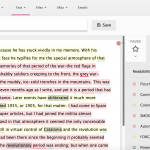When I’m not thinking about health literacy, I’m typically reading or playing music (not John Cage). I keep an ever-growing list of books to read, and it’s influenced by recommendations from friends, colleagues, and family. Which is how I ended up reading Douglas Hofstader’s book, Godel, Escher, Bach: an Eternal Golden Braid – and connecting it to health literacy.
What is Godel, Escher, Bach?
Godel Escher, Bach is a 750pg tome. Hofstader’s premise is that consciousness comes from the ability to know you exist. Less “I think, therefore I am” and more “I realize I’m thinking, therefore I am.”
Although the book covers a lot of ground (in 750 pages, it better!), a few sections jumped out at me. First, the idea that a message has three “layers.” These layers are the inner message (the meaning), the frame message (the fact that there is a message), and the outer message (the way to read the message).
To understand the inner message is to have extracted the meaning intended by the sender.
The frame message is the message “I am a message; decode me if you can!”; and it is implicitly conveyed by the gross structural aspects of any information-bearer.
To understand the frame message is to recognize the need for a decoding-mechanism.
If the frame message is recognized as such, then attention is switched to level (2), the outer message. This is information, implicitly carried by symbol-patterns and structured in the message, which tells how to decode the inner message.
To understand the outer message is to build, or know how to build, the correct decoding mechanism for the inner message.
Godel, Escher, Bach: an Eternal Golden Braid (Chapter VI), by Douglas Hofstader
As an example, take this article. You are grasping the meaning of the inner message. The frame is the letters. You see them and know this is something you can read. And the outer message is your knowledge of English and reading.
What Does That Have to do with Healthcare Writing?
I didn’t immediately make the jump from Godel, Escher, Bach to healthcare writing. That came when I read another section, this one on the music of John Cage. (John Cage wrote pieces such as 4’33, which is 4 minutes and 33 seconds of silence. Timed.)
[Imagine sending music to an alien civilization.] A Cage piece has to be taken in a large cultural setting—as a revolt against certain kids of traditions. Thus, if we want to transmit that meaning, we must not only send the notes of the piece, but we must have earlier communicated an extensive history of Western culture. It is fair to say, then, that an isolated record of John Cage’s music does not have an intrinsic meaning. However, for a listener who is sufficiently well versed in Western and Eastern cultures, particularly in the trends in Western music over the last few decades, it does carry meaning—but such a meaning is mostly contained inside the listener to begin with; the music serves only to trigger it.
Godel, Escher, Bach an Eternal Golden Braid (Chapter VI), by Douglas Hofstader
In other words, unlike this article, John Cage’s music doesn’t stand alone. The frame might still look like music, but either the outer message or the internal message needs to include a lot of background information for the music (inner message) to make sense.
Which brings me to our language in healthcare.
Does Your Healthcare Writing Need Context?
Pretty much no one listens to Cage’s music for fun. It’s not good background music, or good running music, or good for an evening of entertainment. It is the kind of thing students listen to – and struggle with – in classes. People are far more likely to choose to listen to (for example) Bach, which though complex is also understandable as music.
When we write healthcare content, we want it to be equally understandable. We want the inner message to come across with as minimal frame (backround) as possible.
For example, we want people to see “emergency room” and know where to go with their broken leg, without pulling out a dictionary. Perhaps more to the point, we want people to see “Cancer center” and know where to head without needing to ask what “Oncologist” means.
Hofstader says that any sufficiently complex system will become self-referential, and that’s not a bad thing. Healthcare is complex, so let’s make sure we think about ourselves. Let’s reference what we are – and let’s do it in a way that makes us more like Bach, and less like John Cage.


